#Hilaire Belloc
Text
Lines for a Christmas Card
by Hilaire Belloc
May all my enemies go to hell,
Noel, Noel, Noel, Noel.
262 notes
·
View notes
Text
Good Omens: Lockdown, Aziraphale’s SAD-ASS desk, and how they get to 'Our bookshop' in S2
Welcome to part 2 of me reading reeaally far into the Good Omens: Lockdown video! (part 1 from Crowley's POV here) This post assumes the item choices in the Lockdown visuals are intentional. What follows is going to be my headcanon regardless, but if you're into the Word of God, Lockdown is canon 'If you want it to be.' and I want it to be, sooo checkmate! >;D
Also this is something of a long boi (~13 minute read without following the links >.>), so if you're into unhinged analysis of details and literary references that indicate Aziraphale is in his longing era and want to learn more about author and fave-of-Gaiman, G.K. Chesterton, either get comfy or mark this to read later when you have time!

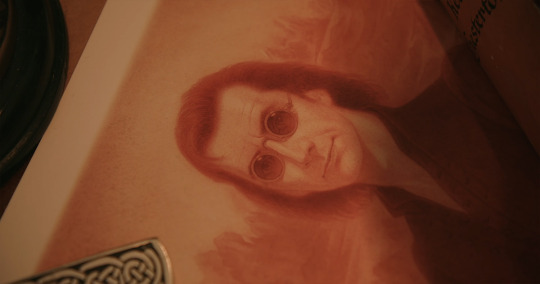
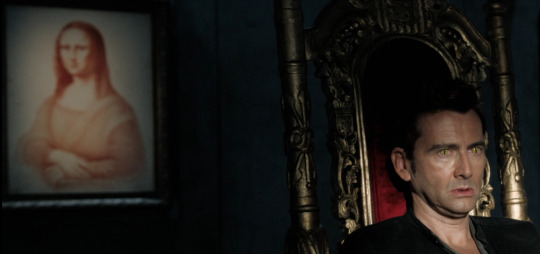
C: What?
A: *somehow surprised even though HE CALLED* A-ah, hello. It's me!
C: I know it's you, Aziraphale.
A: *regaining composure* Yes, well, just calling to see how you were doing in lockdown.
The video starts with shots of Aziraphale and Crowley's da Vinci sketches (and some sushi remnants)... Babygirl is flipping through the time-goes-too-fast-for-me version of a facebook album, thinking about his crush. vERY chill of him. (also the paper looks new and he's eating on top of them, suggesting these are prints and he has multiple copies of them... sooo normal)
If we look closer at the still of Crowley's portrait, we can see part of the spine of a book that reads Kei- Chesterto-. This is, of course, author Gilbert Keith Chesterton, to whom Neil and Terry (and Crowley) dedicated Good Omens:
The authors would like to join the demon Crowley in dedicating this book to the memory of
G. K. Chesterton
A man who knew what was going on.
In this post by @azfellandco about Chesterton, you can see a photo of the dedication page and also read the book excerpt where Crowley describes Chesterton as 'the only poet in the twentieth century to even come close to the Truth'.
C: I'm bored. I'm so very very bored - transcendentally bored. There's nothing to do here!
As Crowley is explaining his nap contingency plan, we get a shot of Aziraphale picking up his mug of hot chocolate, then the image below of the 2/3rds gone bottle of Courvoisier cognac (i mean maybe he is baking with it let's not jump to conclusions), and then the stack of books beside a framed woodcut print of witches dancing with devils...

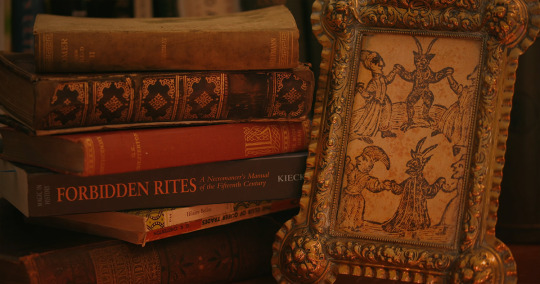
...that I used reverse image search to trace back to page 17 of a book from 1720 called The history of witches and wizards: giving a true account of all their tryals in England, Scotland, Swedeland, France, and New England; with their confession and condemnation.
Interestingly, the text above and below the picture reads:
At their Meeting they have usually Wine, or good Beer, Cakes, Meat, or the like; they Eat and Drink really: When they meet in their Bodies, Dance also, and have Musick...
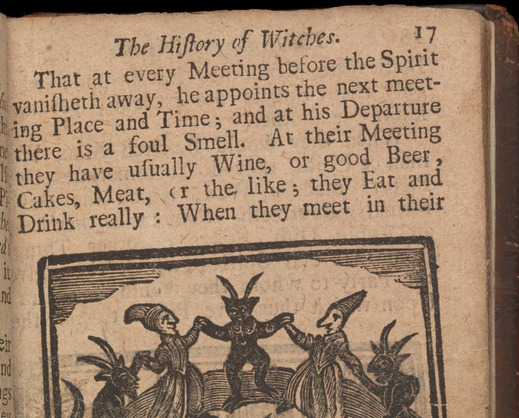
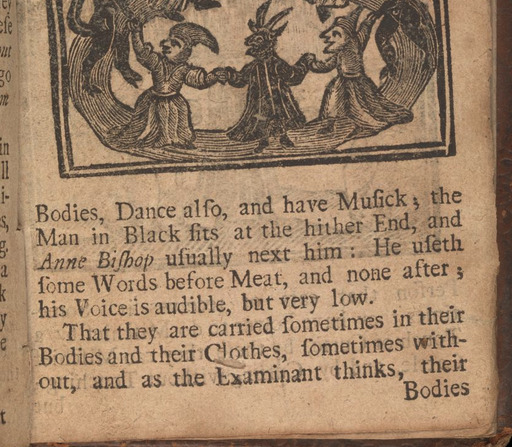
Beside the framed print of Aziraphale's idea of a really great night out is a stack of books that includes (going from top to bottom):
Homer's The Iliad, Book 2
Orthodoxy by G.K. Chesterton
Forbidden Rites: A Necromancer's Manual of the Fifteenth Century by Richard Kieckhefer
a book by Hilaire Belloc with no visible title
The Club of Queer Trades by G.K. Chesterton
The Iliad (according to sparknotes) has the following major themes:

....Interesting, ok. Book 2 in particular starts with a god (Zeus) messing with someone (Agamemnon) via a dream that says he will be successful in taking Troy if he launches a full assault, balls to the (city) wall. Agamemnon, who is supposed to be leading the Achaean army to conquer Troy, believes the dream but then in a weird twist decides to test his army and be like 'jk actually I'm giving up and going home' and then is mad when the soldiers are like 'sick, to the boats!' Then Odysseus, who sparknotes tells me is the most eloquent of the Achaeans, gives an impressive speech to inspire the troops and reminds them that they vowed 'that they would not abandon their struggle until the city fell.' ...No way that could worsen Aziraphale's internal conflict about being a bad Angel who thwarted the Great Plan. >.>; Orthodoxy we'll get to in a second.
Then there's Forbidden Rites which is a medieval necromancy guide translated from Latin with added commentary - Aziraphale is perhaps studying occult topics in an attempt to understand Crowley better? And then there's the Hilaire Belloc book on top of the second Chesterton book, a collection of related stories/episodes?, The Club of Queer Trades. The book's Wikipedia page says:
Each story in the collection is centered on a person who is making his living by some novel and extraordinary means. To gain admittance [to the Club of Queer Trades] one must have invented a unique means of earning a living and the subsequent trade being the main source of income.
Aziraphale and Crowley have rather novel/extraordinary jobs and they're both peculiar-queer and gay-queer. Neat. The narrator in the book is named Charlie "Cherub" Swinburne - also neat. >.> He goes on an adventure with his friend, a retired judge and president of the Club of Queer Trades, Basil Grant, (who Oct 2021 GoodReads reviewer Cecily said is "described as mad, mystical, and a poet, with almost no friends, but who “would talk to any one anywhere”) and Basil's younger brother, a private detective named Inspector Constable Rupert Grant. The last line of the book is:
Thus our epic ended where it had begun, like a true cycle.
(something something "It starts, as it will end, with a garden.")
Anyway, the Belloc book and The Club of Queer Trades are placed back to back in such a way that they almost look like they could be one book with two different aesthetics, or... two halves of a pantomime beast?! (stay with me I needed a segue)

Belloc and Chesterton have what is essentially a ship name:

It was coined by George Bernard Shaw (if you are like me and didn't know why you've heard of him: he wrote, among other things, Pygmalion, which was adapted into My Fair Lady). Shaw apparently liked to gossip about Belloc and Chesterton with H.G. Wells (again if you're uncultured like me: he wrote, among other science fiction-y things, The War of the Worlds).
In the Feb 15, 1908 issue of The New Age newspaper, Shaw said:

He continued:
"Chesterton and Belloc are so unlike that they get frightfully into one another’s way. ... They are unlike in everything except the specific literary genius and delight in play-acting that is common to them, and that threw them into one another’s arms.”
Shaw says Belloc is 'a bit of a rowdy', and 'cannot bear isolation'. Hmm. Then he says Chesterton is 'friendly, easy-going, unaffected,
gentle, magnanimous, and genuinely democratic'. HMM.
“They share one failing—almost the only specific trait they have in common except their literary talent. That failing is, I grieve to say, addiction to the pleasures of the table.”
Ok ok I think we can see where this is going.
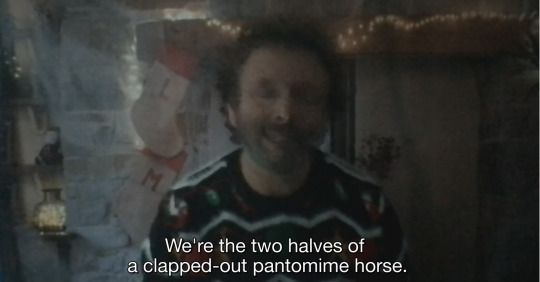
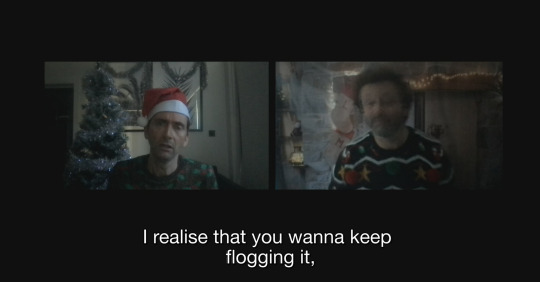
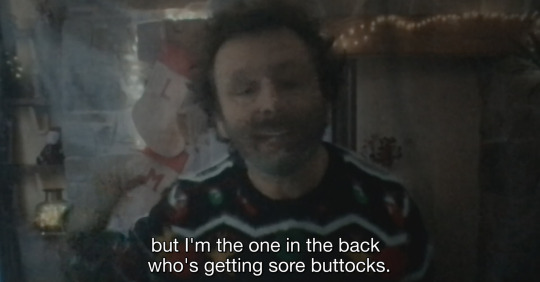
(^ from Staged S3E6)
Now, someone did ask Neil Gaiman about this similarity, and he said the Lockdown video was filmed by Rob Wilkins in Terry Pratchett's library, and that he suspects 'Belloc is there because he was on Terry's shelves beside Chesterton.' And it MAY VERY WELL BE that NONE (0) of the book titles are meant in any way other than 'these are books from Sir Pratchett's library that looked nice on camera and ofc we wanted some Chesterton refs and maybe some demon-y stuff for Crowley' but that is WAY less fun so I am choosing to take them as intentional: these are books Aziraphale is actually reading (along with the sushi and many cakes he is actually eating). Let's put ourselves in Aziraphale's shoes and try to imagine how it would be to read this stuff during lockdown while you pine for a demon with slinky hips after you got in big trouble at work for Armageddoff (and work happens to have defined your worldview and general purpose in life).
C: welll... ngk then people might follow my bad example and get ill. Or even die—
As Crowley acknowledges that he ought to be out making peoples' lives worse, we see Orthodoxy by Chesterton open on the desk.
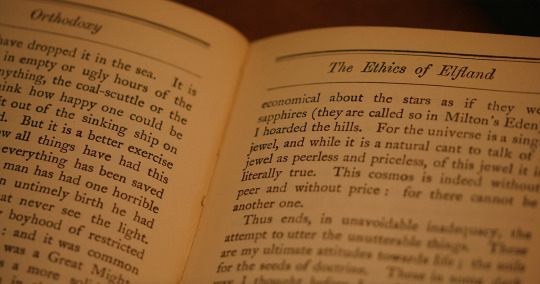
Orthodoxy is described as a ‘spiritual autobiography’ and is considered a classic of Christian apologetics, i.e. the religious discipline of defending religious doctrines (in this case, Catholic) through systematic argumentation and discourse. Wikipedia also says Chesterton's The Everlasting Man contributed to C.S. Lewis' conversion to Christianity, so overall it sounds like he must've been fairly convincing. (and so maybe reading it also poked at that work-related-but-religious-trauma-adjacent stuff Aziraphale has going on?)
You can read Orthodoxy (and probably any of the books I mention bc theyre all old) on project gutenberg but I will include this part of what is shown on the righthand page bc it just reminds me (and so probably Azirapalala as well) of a certain angel squeaking happily at a nebula:
"I felt economical about the stars as if they were sapphires (they are called so in Milton's Eden): I hoarded the hills. For the universe is a single jewel, and while it is a natural cant to talk of a jewel as peerless and priceless, of this jewel it is literally true. This cosmos is indeed without peer and without price: for there cannot be another one."
Ok great, so Aziraphale is diving into the works of one of Crowley's favorite authors bc he misses him, that's cute. What else? Oh he already wrote him a letter right before calling - THE WICK ON THE WAX STICK FOR THE SEAL IS STILL SMOKING. sO CASUAL asdashgfjds
something something 'either call on the phone and talk, or appear mysteriously; don't do both'
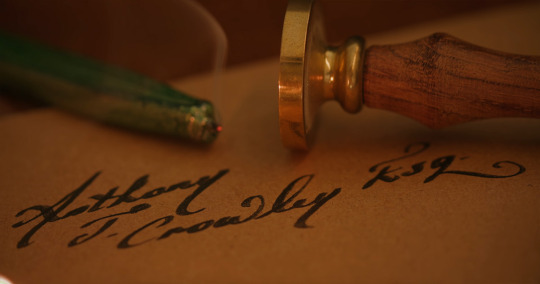

When Aziraphale gets to 'I've never had so few customers, not in two hundred years!' We get a close up of this glass of cognac with droplets still on the side — I take back what I said about baking, Aziraphale is drinking it~
He's not drinking a wine, eg Châteauneuf-du-pape, which would be ~14% alcohol by volume (ABV), or a sherry (15-20% ABV); he is drinking Courvoisier cognac, a hard liquor (40% ABV). Crowley's Talisker whisky is 48.5% while we are on the topic. This is stronger than what Aziraphale usually drinks which means... he could be a bit tipsy.
As Aziraphale starts talking about the would-be cash-box burglary, we get this wide shot of the desk:

In the top left hand corner, we see two stacks of books, most (all?) of which appear to be Chesterton when I zoom in. Some of them have Chesterton's name visible on them, others have the publisher name 'Darwen Finlayson' on them, which according to my googling is a house that published several of Chesterton's works. If Chesterton was truly 'a man who knew what was going on', then perhaps this is Aziraphale seeking not just to feel closer to Crowley, but also to make sense of the warring ideas in his mind. Interestingly, Chesterton has also been described as 'The Eccentric Prince of Paradox'.
C: *clearly amused* Did you smite them with your wroth?
The screen then shows two occult-y books and a flickering candle (lower left image). Then Aziraphale explains about his cake~, and as Crowley cuts him off because he's about to nervously ask to come over bc he is so so lonely & down bad for a certain angelic bookworm, we see a map of Oxfordshire on top of Pilgrim's Progress (lower right image).
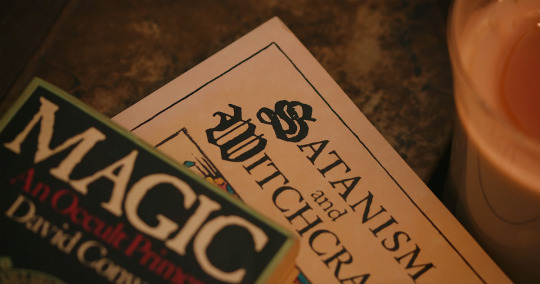
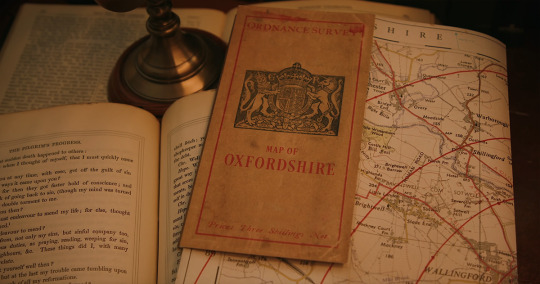
The two books beside the candle are Satanism and Witchcraft (presumably the 1862 book by Jules Michelet that comes up when I search the title), and another called Magic: An Occult Primer.
Satanism and Witchcraft is described on Wikipedia as 'notable for being one of the first sympathetic histories of witchcraft' and says 'Michelet was one of the first few people to attempt to show the sociological explanation of the Witch Trials.’ Sympathy for people who like to eat/drink/dance with demons, if you will?
Magic: An Occult Primer is a 1972 book by David Conway, a Welsh (CACHU HWCH!) magus and is described as 'a seminal work that brought magical training to the every-magician'. It also includes an appendix called The Occult Who's Who, which is somewhat reminiscent of Hastur's Furfur's book about angels. In Chapter 11: A Word About Demons, it says in regard to summoning them:

"Assuming that the form has turned up in the right place, it will soon begin to act and talk in a very friendly manner; do not forget, however, that its winning ways conceal a sinister intention-- namely, to get the adept out of the circle, and into its clutches.”
...okay?? Aziraphale's desk has a flickering candle on it throughout the video, and we get a close up of the flame when Crowley offers to slither over:
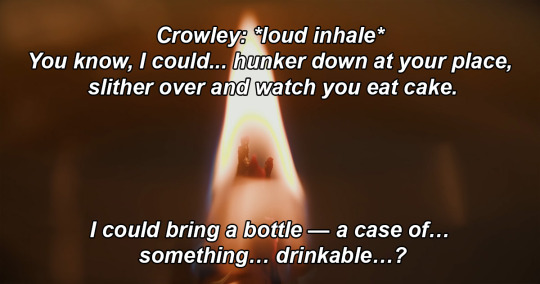
and just like that, Aziraphale has summoned a demon~~
Naturally, he freaks out:
A: *panicking*Oh I— I— I— I— I'm afraid that would be Breaking All The Rules! *nervous breathing* Out of the question! I'll see you… when this is over.
But why? Isn't this what he wanted? Let's go back to the Pilgrim's Progress shot from right before the successful demon summoning and zoom in:
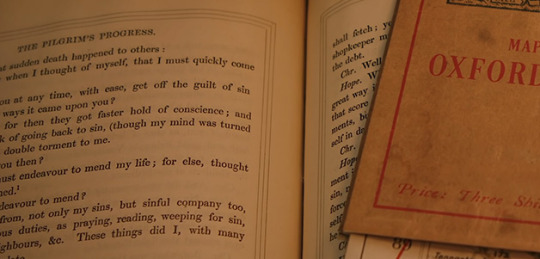
In a similar vein to Orthodoxy, Pilgrim's Progress, by John Bunyan, is an allegorical Puritan conversion narrative. Christian is the main character / stand in for anyone who wants to be in the allegory and Hopeful is well, hopeful, from what I gather. A slightly larger continuous excerpt is here for the curious, but here are some bits I thought were especially interesting in the part of the book shown above:
Christian: Why, what was it that brought your sins to mind again?
Hopeful: Many things; as,
If I did but meet a good man in the streets; or,
If I have heard any read in the Bible; or,
If mine head did begin to ache; or,
If I were told that some of my neighbors were sick; or,
If I heard the bell toll for some that were dead; or,
If I thought of dying myself; or,
If I heard that sudden death happened to others;
But especially when I thought of myself that I must quickly come to judgment.
Perhaps the pandemic is bringing Aziraphale's "sins" to mind again, on top of the whole choosing faces thing to avoid 'quickly coming to judgment'. And then:
Hopeful: I thought I must endeavor to mend my life; for else, thought I, I am sure to be lost forever.
Christian: And did you endeavor to mend?
Hopeful: Yes, and fled from not only my sins, but sinful company too, and betook me to religious duties, as praying, reading, weeping for sin, speaking truth to my neighbors, etc.
UM??? While I can't say about the praying or weeping for sin, he has definitely been reading and the whole 'giving a good talking to' the burglars could be 'speaking truth to [the] neighbors'...?
Anyway to recap:
Aziraphale has been poring over books about dark magic and demons as well as a ton of books by an author that Crowley loves and who formed a partnership w a very different person in a sort of yin-yang, pantomime beast situation
He has been looking at pictures that remind him of their fun times w Leo in Florence and eating sushi and cake cake cake (and forgiving sinners) and drinking hot chocolate and cognac trying to fill a void but now he's tipsy so he wrote Crowley a letter, stamped it with a wax seal and then thought 'I should call her' BUT
His recent brush with attempted death penalties, the death toll of the pandemic, and some of the religious books he was reading have also filled him with guilt/fear over disobeying Heaven, who he knows could still be watching him and Crowley, so he feels much more conflicted than usual AND
He probably has some inkling that he wants to go ape shit on that ox rib if it comes over to hang out (lol editing to add bc i remembered ox rib discourse: ape shit in an emotional way! whether you hc them as ace or not I just think he really likes him and I’m using ox ribs as a stand in for general forbidden joy/love, not specifically sexy stuff)
So he has to say no.
Anything else might cause him to spontaneously discorporate into a plume of pining and cognitively dissonant gay smoke, which may be all well and good if you only think there's a God, but if you KNOW it and the angels are absolutely recording you and Heaven just tried to kill you and your wife colleague, it's... kind of a big deal.
C: Right. gnnehh. I'm setting the alarm clock for July. Good night, angel.
*dial tone*
We don't get to hear Aziraphale's response, but besties you and I both know he is not feeling tickety-boo. He spent like a month putting off calling Crowley (UK lockdowns started end of March, the call is at the beginning of May), finally got drunk and said what the Hell, it'll just be a fun flirty chat in between his temptations, and then it turned out Crowley was depressed and not going anywhere and Aziraphale made him even sadder. And then it got worse because it wasn't all over in July, or in October, even.
I think Aziraphale ends up with a lot of time and brain space in which to think about how Orthodoxy and Pilgrim's Progress were only written to guide *mortals* and how it really wouldn't be so bad if he spent more time with Crowley, would it? Heaven hasn't reached out in actual years again, things feel safer. Crowley is essentially Good and spending time with him would be sort of ministering to the downtrodden and afflicted, and Aziraphale does miss reporting his good deeds (lol you know, whatever rationalizations you need to get you there).
More than anything, he thinks about how hollow everything feels without Crowley; how no mouthful of food or drink tastes as satisfying in his absence because it wasn't ever just about the 'gross matter'...
So when lockdowns end, Aziraphale begins to summon his demon again, but this time with much less inner struggling. It all comes so naturally, when you let it. By the beginning of Season 2 in 2023, they seem delightfully comfortable with their shared routines and places (see also this lovely post by @nightgoodomens). Our car. Our bookshop.
Aziraphale might take longer to catch up, but he does get there.
(SHHH DON'T THINK ABOUT EPISODE 6! STOP! I'M HANGING UP!)


“The way to love anything is to realize that it may be lost.”
― G.K. Chesterton
#good omens meta#good omens analysis#good omens#ineffable husbands#good omens lockdown#ineffable idiots#IF YOU READ TO THE END ILYSM but you're probably sitting like a shrimp now so please stretch and hydrate <3#i've connected the dots#(you haven't connected shit)#maybe i created the dots myself but i connected them#lol i essentially wrote a fixit meta bc the first meta was so sad#long reads#neil gaiman#rob wilkins#tw alcohol#g. k. chesterton#hilaire belloc#the chesterbelloc#aziraphale fumbling a bitch so damn hard#michael sheen's clapped-out sore buttocks
320 notes
·
View notes
Photo
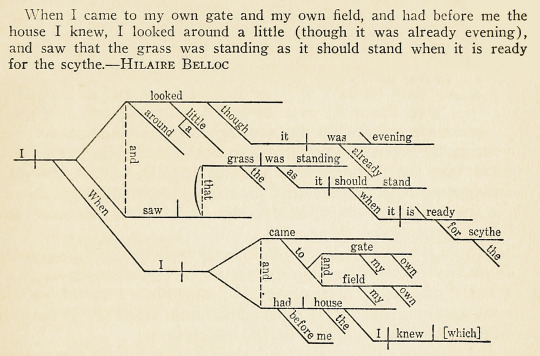
Source details and larger version.
Some intriguing vintage sentence diagrams.
36 notes
·
View notes
Photo
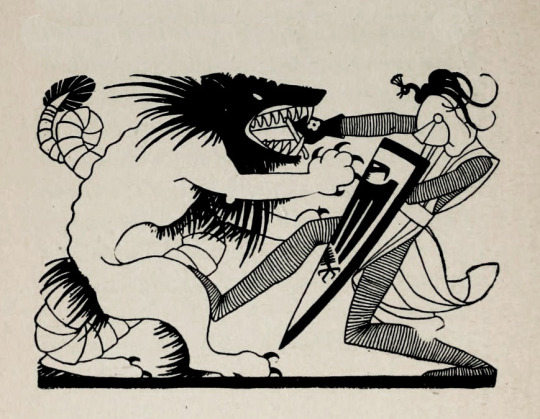
Illustration by Mac Harshberger for the 1927 English edition of Tristan and Iseult by Joseph Bédier, translated by Hilaire Belloc.
#illustration#book#books#legends#medieval#knight#tristan and iseult#tristan and isolde#mac harshberger#joseph bedier#hilaire belloc
108 notes
·
View notes
Text
The Barbarian hopes — and that is the mark of him, that he can have his cake and eat it too. He will consume what civilization has slowly produced after generations of selection and effort, but he will not be at pains to replace such goods, nor indeed has he a comprehension of the virtue that has brought them into being.
Discipline seems to him irrational, on which account he is ever marvelling that civilization, should have offended him with priests and soldiers.... In a word, the Barbarian is discoverable everywhere in this, 𝐭𝐡𝐚𝐭 𝐡𝐞 𝐜𝐚𝐧𝐧𝐨𝐭 𝐦𝐚𝐤𝐞: that he can befog and destroy but that 𝐡𝐞 𝐜𝐚𝐧𝐧𝐨𝐭 𝐬𝐮𝐬𝐭𝐚𝐢𝐧; and of every Barbarian in the decline or peril of every civilization exactly that has been true.
We sit by and watch the barbarian. We tolerate him in the long stretches of peace, we are not afraid. We are tickled by his irreverence; his comic inversion of our old certitudes and our fixed creed refreshes us; we laugh. But as we laugh we are watched by large and awful faces from beyond, and on these faces there are no smiles.
— Hilaire Belloc (1912)
#hilaire belloc#barbarians#society#civilization in decline#civilization#1912#discipline#how a society crumbles#history#we never learn#essays#great writers#easier to destroy than build and preserve#easier to destroy than create
17 notes
·
View notes
Text
For there enters an element of Comedy (in the full sense of that great word) whenever we watch the death or passing of a human mood which had thought itself absolute and eternal. There is a high comedy in discovering new moods still timid or struggling, which will in their turn affirm themselves to be indestructible, and in their turn will die. To this comic interest is added another of a very practical kind: forewarned is forearmed.
Hilaire Belloc
22 notes
·
View notes
Text
The Lion
The Lion, the Lion, he dwells in the Waste,
He has a big head and a very small waist:
But his shoulders are stark, and his jaws they are grim,
And a good little child will not play with him.
~~Hilaire Belloc
5 notes
·
View notes
Text
When I am dead, I hope it may be said: His sins were scarlet, but his books were read. Hilaire Belloc https://dictionary-quotes.com/when-i-am-dead-i-hope-it-may-be-said-his-sins-were-scarlet-but-his-books-were-read-hilaire-belloc/
3 notes
·
View notes
Text

A Remaining Christmas by Hilaire Belloc
“Now, you must not think that Christmas being over, the season and its glories are at an end, for in this house there is kept up the full custom of the Twelve Days, so that ‘Twelfth Day’, the Epiphany, still has, to its inhabitants, its full and ancient meaning as it had when Shakespeare wrote.
The green is kept in its place in every room, and not a leaf of it must be moved until Epiphany morning, but on the other hand not a leaf of it must remain in the house, nor the Christmas tree either, by Epiphany evening.
It is all taken out and burnt in a special little coppice reserved for these good trees which have done their Christmas duty; and now, after so many years, you might almost call it a little forest, for each tree has lived, bearing witness to the holy vitality of unbroken ritual and inherited things.
In the midst of this season between Christmas and Twelfth Day comes the ceremony of the New Year, and this is how it is observed:
On New Years’ Eve, at about a quarter to twelve o’clock at night, the master of the house and all that are with him go about from room to room opening every door and window, however cold the weather be, for thus, they say, the old year and its burdens can go out and leave everything new for hope and for the youth of the coming time.
This also is a superstition, and of the best. Those who observe it trust that it is as old as Europe, and with roots stretching back into forgotten times.
While this is going on the bells in the church yard by are ringing out the old year, and when all the windows and doors have thus been opened and left wide, all those in the house go outside, listening for the cessation of the chimes, which comes just before the turn of the year.
There is an odd silence of a few minutes, and watches are consulted to make certain of the time (for this house detests wireless and has not even a telephone), and the way they know the moment of midnight is by the boom of a gun, which is fired at a town far off, but can always be heard.
At that sound the bells of the church clash out suddenly in new chords, the master of the house goes back into it with a piece of stone or earth from outside, all doors are shut, and the household, all of them, rich and poor, drink a glass of wine together to salute the New Year.
This, which I have just described, is not in a novel or in a play. It is real, and goes on as the ordinary habit of living men and women.
I fear that set down thus in our terribly changing time it must sound very strange and, perhaps in places, grotesque, but to those who practice it, it is not only sacred, but normal, having in the whole of the complicated affair a sacramental quality and an effect of benediction: not to be despised.
Indeed, modern men, who lack such things, lack sustenance, and our fathers who founded all those ritual observances were very wise.”
‘Stand thou for ever among human Houses,
House of the Resurrection, House of Birth;
House of the rooted hearts and long carouses,
Stand, and be famous over all the Earth.”
28 notes
·
View notes
Text
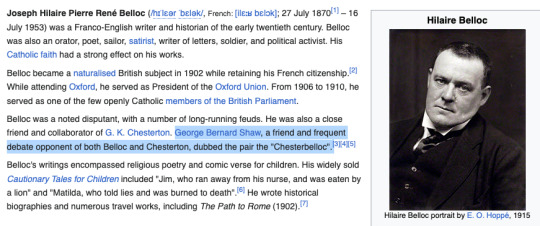
You guys, did George Bernard Shaw invent shipping portmanteaus?
8 notes
·
View notes
Text
The Protestant attack differed from the rest [of the challenges to Catholicism] especially in this characteristic, that its attack did not exist in the promulgation of a new doctrine or a new authority, that it made no concerted attempt at creating a counter-Church, but had for its principle the denial of unity. It was an effort to promote that state of mind in which a Church in the old sense of the word -that is, an infallible, united, teaching body, a Person speaking with Divine authority- should be denied; not the doctrines it might happen to advance, but its very claim to advance them with unique authority.
Thus, one Protestant might affirm, as do the English Puseyites, the truth of all the doctrines underlying the Mass -the Real Presence, the Sacrifice, the sacerdotal power of consecration, etc.- another Protestant may affirm that all such conceptions are false, yet both these Protestants are Protestant because they communicate in the fundamental conception that the Church is not a visible, definable, and unified personality, that there is no central infallible authority, and that therefore each is free to choose his own set of doctrines.
Such affirmations of disunion, such denial of the claim to unity as being part of the Divine order, produced indeed a common Protestant temperament through certain historical associations; but there is no one doctrine nor set of doctrines which can be affirmed as being the kernel of Protestantism. Its essential remains the rejection of unity through authority.
- Hilaire Belloc (The Great Heresies, pages 16-17). Italics original, bolded emphases added.
11 notes
·
View notes
Text
“There are only two alternatives for society; Catholicism or chaos. If it is not to be chaos, if Christ is not to abandon us, then Christ must reign, and if He is to reign He can only do so if we, who claim to be His disciples, restore Him to His rightful throne.”
- Hilaire Belloc
13 notes
·
View notes
Text
On His Books by Hilaire Belloc
When I am dead, I hope it may be said:
'His sins were scarlet, but his books were read.'
1 note
·
View note
Photo
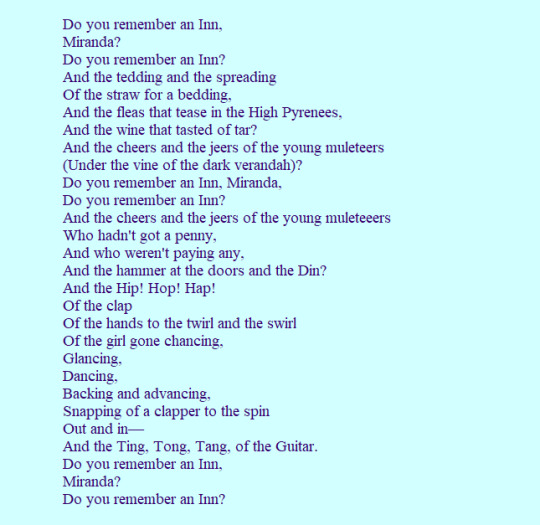

“Tarantella” by Anglo-French poet Hilaire Belloc (1870–1953), published 1929
3 notes
·
View notes
Text
Cautionary Tales & Nonsense Verse
I was brought up on Struwwelpeter.
5 notes
·
View notes
Quote
It freezes- all across a soundless sky
The birds go home. The governing dark's begun:
The steadfast dark that waits not for a sun;
The ultimate dark wherein the race shall die.
Death, with his evil finger to his lip,
Leers in at human windows, turning spy
To learn the country where his rule shall lie
When he assumes perpetual generalship.
The undefeated enemy, the chill
That shall benumb the voiceful earth at last,
Is master of our moment, and has bound
The viewless wind it-self. There is no sound.
It freezes. Every friendly stream is fast.
It freezes; and the graven twigs are still.
Hilaire Belloc, ‘January’
2 notes
·
View notes